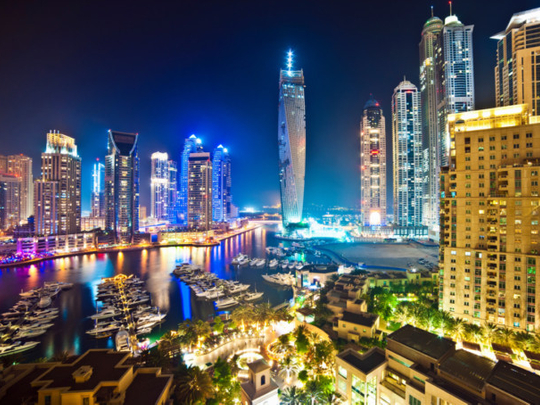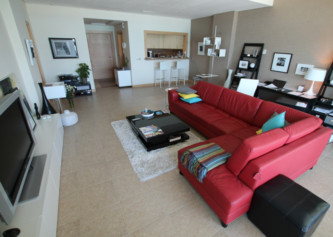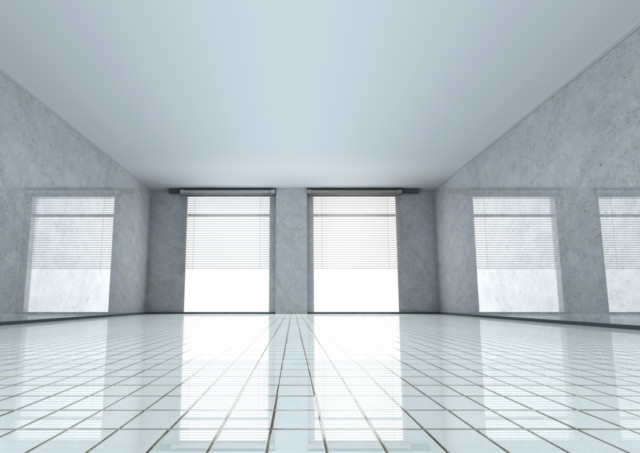
Residential tenants in Dubai are spoilt for choice. The real estate market offers several options ranging from unfurnished units to fully furnished serviced apartments, giving customers the freedom to choose the most appropriate property that fits their needs.
Fully furnished units in the city offer everything from furniture and white goods to items such as pots, cutlery, etc., explains Russell Owen, Property Consultant at Ere Homes. Most semi-furnished apartments, on the other hand, usually offer only white goods and some furniture. Furnished serviced apartments are popular options as they offer full furnishings as well as cleaning, management and even maintenance services.
Choosing between a furnished, unfurnished or serviced property can be a difficult decision. Property Weekly examines all the options to help tenants find the right property and bag the best deals.
Popular areas
“Areas such as Jumeirah Beach Residence and serviced apartments in Tecom and Al Barsha, to name a few, offer furnished units,” says Yasser Zabalawi, Residential Consultant at Better Homes. “There are also a lot of homeowners in Dubai Marina who offer their properties for rent as furnished homes, plus there are a few villas available as furnished units in the Springs.”
With numerous units offering different kinds of options, tenants may find it challenging to decide on what ideally suits them.
“I was looking for a furnished two-bedroom apartment in Dubai Marina with modern furnishings,” says Owen. “My budget was Dh150,000 per year, but after a long search, I realised it was very hard to find the right style of furniture I desired within my budget. There were a couple of units with very modern furniture for Dh170,000 in the same building where I found a similar unfurnished unit for Dh120,000.
“After reviewing both options, I ended up renting an unfurnished unit for Dh120,000 and spent Dh35,000 on furnishings and even then I technically managed to save about Dh15,000.”
Owners’ concern
Property owners also have their own concerns when choosing to let out their properties as furnished or unfurnished units. According to Elliott Starr, Senior Property and Investment Consultant at Provident Estate, property owners often consult with agents whether to furnish their property or not.
In reality, unfurnished properties make up a significant majority of transactions in the market. “Around 75 per cent of people select unfurnished units and only 25 per cent pick furnished properties,” says Owen.
Tenants in Dubai tend to pick unfurnished units because it offers the freedom to style the property according to their needs. For long-term occupants, unfurnished units are also more economical.
It is the property owner’s call to furnish an apartment or villa. For those who choose to offer furnished property, it is important to remember that the quality of furnishings will be crucial in attracting people to the property. Otherwise, it can be a hindrance in the selling or leasing process.
“A landlord will not spend a lot of money on furniture from scratch, on a whim,” says Starr.
Money spent on furnishings is often planned and balanced against the property’s rental income or the sale price, since the common goal in both cases is to increase marketability and find a suitable tenant or buyer who will offer a higher rent or sale price, adds Starr.
He says, “The premium added to a furnished unit is around 20 per cent in the region.”
As such, the rental cost of an unfurnished apartment or town house in Downtown Dubai could be around Dh100,000 per year. When furnished the same unit’s rental cost could reach at least Dh120,000.
Cost and comfort are the prime factors that attract buyers and tenants to a property. The main aim is to reduce the cost and maximise the comfort level, but these two factors don’t always go together. “The problems that usually get in the way are style, individual taste and the unrealistically high premiums set by landlords and owners,” says Starr. “The look of an apartment is a very personal thing, therefore in Dubai there is a plethora of properties for lease and sale that are painted white, cream or magnolia, like a blank canvas.”
It is essential to keep home interiors neutral and clean as over-personalising or using bold colours or extraordinary furnishings may not be to the buyers’ or tenants’ liking, leaving the property in the market for longer.
Common mistake
It is a common misconception that adding furniture and appliances to the unit will help fetch a higher sale or rent price. According to Starr, many property owners leave furniture in the unit because they want to save themselves the cost of removing and placing the furniture in storage.
“They seek to pass on the cost of storing the furniture to the tenant or buyer,” he says. “It is a mistake to furnish a property just for the sake of it, without checking the furniture’s quality, because in reality this is likely to dissuade any tenant or purchaser from considering the property. My advice to landlords and sellers is, if furnishings can’t be done properly and in an attractive and stylish way, then don’t do it.”
If a homeowner decides to sell a property as a furnished unit, it is ideal to seek professional help from a company that provides leased soft furniture services. This will allow the owner to furnish the property without going through the hassle of buying new furniture and the chain of issues that go with it Starr points out.
“They work based on the rental cost and offer the option to purchase at the end of the contract for just the cost of one or two extra months’ lease,” he says. “The price for leasing and staging a typical two-bedroom apartment starts at Dh3,000 per month, whereas a high-end unit such as a villa on the Palm Jumeirah would cost upwards of Dh50,000 for these services.”
Starr adds: “Several buy-to-let service companies also offer packages to suit one’s budget. They’re not just furnishings but also wall art right down to the cutlery and linen in bedrooms and bathrooms. This allows the property owner or seller to present an impressively furnished unit without much effort.”
Deposit
Renting a furnished unit is generally more expensive compared to an unfurnished unit and the cost varies based on the size, type of apartment and quality of the furnishings. According to Owen, the cost of furnishing a one-bedroom apartment with cheap furniture could be as low as Dh5,000. Using more expensive interiors could bump up the cost to about Dh15,000. For a two-bedroom unit, the ideal cost is between Dh20,000 and Dh35,000. However, there are some property owners in Dubai who spend up to Dh100,000 on superior-quality furnishings.
There is no fixed rule on the furnishing cost, since this largely depends on individual preference and budget, which would then be reflected on the property’s sale or rent value.
“The monthly rental price of an average unfurnished one-bedroom apartment in Dubai Marina is Dh70,000-Dh90,000. For furnished apartments, you will have to pay Dh10,000-Dh20,000 extra,” says Owen. “For a two-bedroom unit, it is Dh120,000-Dh140,000 and you will have to pay Dh10,000-Dh30,000 more for a furnished unit.
“Generally, for smaller property such as one- and two-bedroom apartments, you will see a difference of Dh10,000-Dh30,000 between a furnished and an unfurnished unit. For villas with four or five bedrooms in Meadows, for example, the rent is around Dh300,000 for an unfurnished villa, whereas a furnished villa’s rent price is around Dh375,000. In Emirates Hills, it is between Dh800,000 and Dh1.5 million for an unfurnished property and up to Dh2.5 million for a furnished one.”
For high-priced rental property, the price difference between an unfurnished and a furnished unit is generally larger. As such, Owen says from a landlord’s point of view, a furnished unit generates more money, although an unfurnished unit sells or rents out faster.
Owen also points out that tenants are usually required to pay a 5 per cent deposit for an unfurnished unit. When it is a furnished unit, it can go up to 15 per cent, although some property owners who provide cheap furnishings often stick to the 5 per cent deposit.
Tenant liabilities
A tenant is accountable for everything within a furnished property. Zabalawi therefore advises tenants to take care of all the furnishings within the unit, since a property owner will often redeem the cost of damage to the property from the tenant’s security deposit. “If any damage is noticed when moving in, the tenant should inform the landlord straight away,” says Zabalawi. “Likewise, if there is a leak or some other damage, it should be reported immediately.”
According to Sunil Saraf, Managing Director of Tanjay Real Estate, the trend is for individual investors to purchase serviced apartments in freehold areas and have these properties managed by the developer or a property management firm as part of a pool of serviced properties for rent. “The individual owner gains revenues from the rental returns,” he says. “In some areas in Dubai, entire serviced apartment buildings are often not sold individually.
“Instead, the entire building is purchased by yield players and then managed by a lessee or an operator.”
The demand for and popularity of serviced apartments is expected to further rise because of the increasing number of tourists visiting the UAE each year, points out Saraf. For the World Expo 2020 alone, Dubai anticipates around 25 million visitors during the event.
The owner of these assets also benefits from higher rental yields because of short-term rental options, adds Saraf. Moreover, he says that if the demand for serviced apartments diminishes for any reason, the building owner has the option to convert the property into a regular apartment building and lease out the units on a long-term basis. He claims this helps mitigate the risks for the property owner.
On the other hand, tenants who rent serviced apartments prefer these units because they don’t have to worry about housekeeping and maintenance, allowing them to focus on the main purpose of their stay in the city, says Saraf.
Population
Anywhere in the world, it is the population and the demographics that influence real estate growth. “A big fundamental issue with Dubai’s property market is that real estate is not linked to population, because the population here is mainly expat driven,” says Saraf. “Hence it remains unpredictable — it can increase or decrease anytime. In other parts of the world, the market is more predictable based on birth rates.”
He also claims that the only real estate products in Dubai that are directly associated with the population growth are hotels and serviced apartments, as these are primarily linked with the UAE’s tourist numbers that are growing steadily every year.
“Any tourist-driven real estate will fundamentally be a stable investment since it can comfortably survive any real estate or economic cycle in Dubai,” says Saraf.
Moreover, serviced apartments also serve both residents and tourists alike, making this type of property a “very solid industry in terms of real estate stability”.
Saraf says: “An ordinary apartment in Dubai worth Dh1 million would generate a yield of 6 per cent annually, whereas a serviced apartment of the same value can make a 7.5 per cent annual yield and sometimes even higher.”
Sound advice
The main advantage of choosing to reside in a furnished unit is to save money and time and avoid all the hassle associated with searching the right kind of furnishings. Jodie Louise Smith, Director of JLS Properties, says furnished units are ideal for new expatriates and those who are unable to furnish the property themselves due to some reason and circumstance.
However, if a tenant or buyer already owns various assets and possessions, then these units are not an ideal choice, adds Smith.
“It is all or nothing in this industry,” she says. “So if you are keen to have your prized possessions near you to feel at home, then a furnished property can become somewhat unfamiliar and will leave you feeling less connected to your home, especially if you are renting,” she says.
In addition, if a buyer or a tenant has a theme in mind, it can take longer to find the right furnished unit as the market does not offer many options. Hence, people looking to just move in or have a change in lifestyle will benefit the most from serviced units, says Smith.
An alternative to furnished units are those managed by an operator or a lessee, who mainly caters to the needs of short-term travellers as well as those who need to stay longer in the country but prefer a hassle-free lifestyle. These types of people do not mind shelling out extra money to free themselves from the burden of home management and maintenance.
Unfurnished apartments, nonetheless, remain the most popular properties in the market and are therefore easier to sell or rent out.
“Renting an unfurnished apartment typically means you have the freedom to put your stamp on a property that is not your own through your possessions and furniture that you have collected for years,” says Smith.













